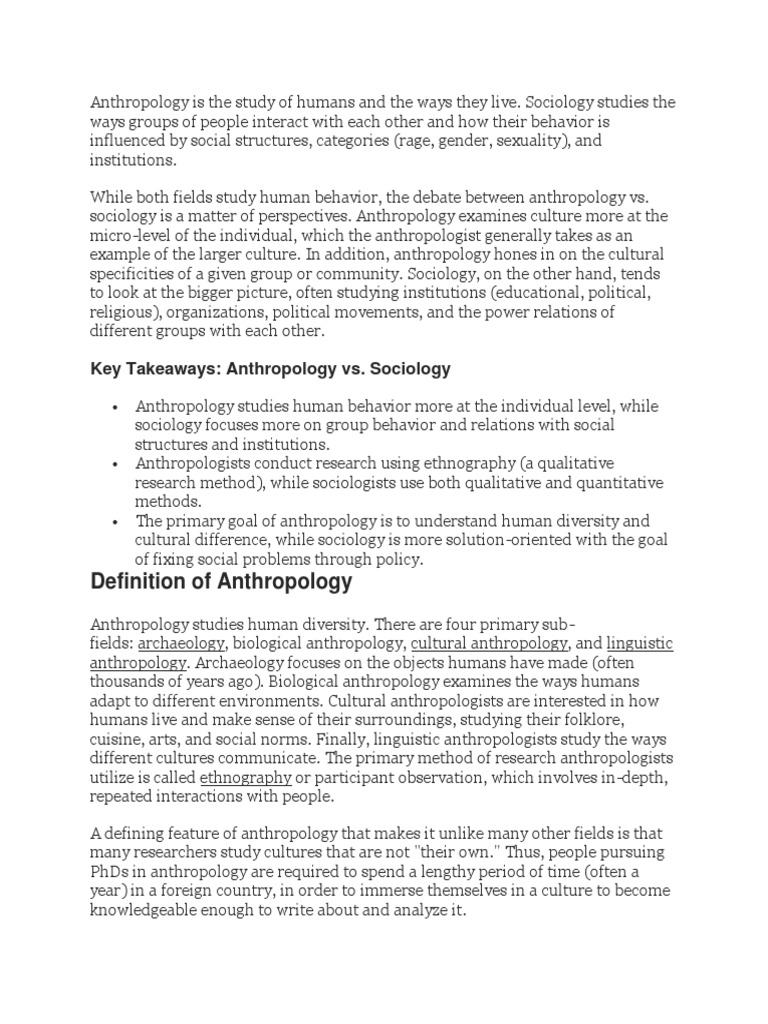Anthropology, an intricate field entrenched in the study of humans, encompasses a broad examination of cultures, societies, and the myriad ways in which human beings interact with one another. Critical to understanding anthropological inquiry is the concept of cultural relativism. This principle posits that one should interpret and analyze cultural phenomena within their own context rather than through the lens of external moral standards. The following exploration delineates how anthropology elucidates the symbiotic relationship between humans and society through the prism of cultural relativism, addressing various dimensions including social constructs, moral paradigms, and the impact of globalization.
To anchor our discussion, it is essential to delineate cultural relativism itself. At its core, cultural relativism emerges as an antidote to ethnocentrism—the tendency to view one’s own culture as superior. Instead, it champions the notion that every culture possesses intrinsic value and must be understood on its own terms. This perspective is foundational in anthropological studies, propelling researchers to approach various societies with a sense of impartiality and openness.
Anthropologists immerse themselves in diverse environments, engaging with cultural practices, traditions, and belief systems. This ethnographic approach allows an in-depth examination of how individuals construct their identities and navigate societal expectations. The immersive experience is paramount; participants are not only observers but also active constituents of the cultures they study. This engagement fosters a deeper understanding of the cultural narratives that shape individual and communal lives.
One critical aspect of the relationship between humans and society is the construction of social norms. Each culture develops its own framework of accepted behaviors—ranging from familial roles to community participation. Anthropologists scrutinize these norms, illuminating how they vary from one society to another, and how they evolve over time. For instance, marriage practices provide a fertile ground for such analysis. In Western contexts, monogamous unions are often seen as the standard; however, polygamy might be prevalent in other cultures. An understanding of these variations mandates a cultural relativist approach to avert misinterpretation of practices that might seem foreign or unacceptable through a Western lens.
Beyond social norms, cultural relativism also addresses moral frameworks. Different cultures possess unique ethical structures that govern interpersonal relations, justice, and social responsibilities. Anthropology examines these moral paradigms, emphasizing that what is considered virtuous in one culture may be perceived as abhorrent in another. For example, the practice of communal sharing in some Indigenous societies starkly contrasts with the Western emphasis on individualism and private ownership. To navigate these moral landscapes effectively, anthropologists must practice cultural relativism, facilitating a nuanced understanding of ethical diversity.
Furthermore, the advent of globalization introduces a dynamic layer to the anthropology of human societies. As cultures interact more than ever before, the impact of transnational exchanges shapes local traditions and social constructs. Globalization often leads to the phenomenon of cultural hybridization, where elements from disparate cultures interweave, forming new, syncretic identities. In this context, cultural relativism is essential; it allows anthropologists to study these shifting identities without imposing an evaluative judgment. This enables a comprehensive examination of how individuals and communities negotiate their cultural affiliations amidst the permeating forces of global capitalism.
Additionally, anthropologists emphasize the role of power dynamics in shaping societal relationships. Such power relations manifest in various contexts, including colonialism, economic disparity, and cultural hegemony. Cultural relativism encourages a critical analysis of these disparities, permitting anthropologists to assess how marginalized groups negotiate their identities within systemic frameworks. Thus, anthropological research often uncovers the resilience and agency of these groups, revealing the intricate interplay of culture and power.
Moreover, the study of symbolic interactions within communities emerges as a cornerstone of anthropological inquiry. Symbols—ranging from language and art to rituals and traditions—serve as indispensable vehicles through which culture is expressed and perpetuated. This symbolic dimension is not merely ornamental; rather, it provides profound insights into the human experience. In a cultural relativist framework, symbols acquire specific meanings within their societal contexts. For instance, the interpretation of funerary rites may vary significantly, even within neighboring communities. Anthropology elucidates these cultural significations, reinforcing the notion that understanding human relationships necessitates an appreciation of the symbolic universe in which they operate.
A conclusion drawn from the anthropological perspective reflects upon the inherent complexity of cultures and societies. It underscores the importance of cultural relativism in fostering a comprehensive understanding of human interactions. As anthropologists navigate the intricate tapestries of human life, they illuminate the profound ways in which individuals not only create meaning but also cultivate relationships within their societal contexts.
Ultimately, the study of anthropology through the lens of cultural relativism offers profound revelations about the human condition. It challenges preconceived notions, advocates for compassion, and emphasizes the value of understanding diverse cultural practices in their own right. In an increasingly interconnected world, this perspective is not merely academic; it serves as a foundational ethos for fostering global empathy and cultural appreciation.
